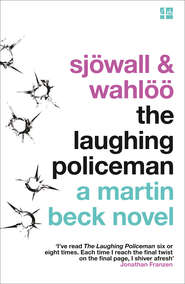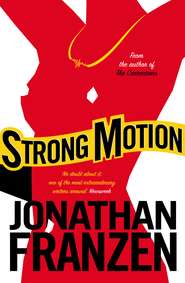По всем вопросам обращайтесь на: info@litportal.ru
(©) 2003-2024.
✖
The Twenty-Seventh City
Автор
Год написания книги
2018
Настройки чтения
Размер шрифта
Высота строк
Поля
RC followed Jammu with his eyes as she bent down over the VIP. What a small woman she was. Smaller than she ever looked in pictures. She wore a light gray trench coat. Her hair was loose and tucked behind her ears. Though only a welterweight himself, RC stared. Such a small little woman.
The VIP struggled to his knees. The front of his suit was stamped with a large, creased grease stain.
Jammu turned to RC. “Whose car was that?”
“Mr. Hutchinson’s. He’s—”
“I know who he is. How did it happen?”
“No idea.”
“What do you mean, no idea?”
RC sweated. “I was trying to get this guy’s Skylark out of, you know, a tight spot. Next thing I know—”
He told her everything he’d seen. He hadn’t seen anything. But she never took her eyes off him. He felt like he was being memorized. When he gave her his name and address she thanked him and, in leaving, brushed his wrist with her fingers. The skin burned. She walked over to the wreck, which was now smoldering and roped off by the cops. RC looked around helplessly again. He still didn’t know what to do. He noticed that the VIP and squad car had disappeared.
The bad thing was, he’d put a dent in Cliff Quinlan’s fender. He knew without going to check. As a job, this joke was getting old, and RC wasn’t stupid. They were taking applications at the Police Academy.
One-fifteen in the afternoon. Jammu stood at the window of a twenty-second-floor room in the Clarion Hotel and directed a yawn at the Peabody Coal and Continental Grain installations across the Mississippi. On the near side of the river, conventioning Jaycees in paper boaters straggled along the footpaths to the Arch. Jammu looked at the reflection of her guest in the window. Karam Bhandari was sitting on the end of the double bed peeling the foil off the bottle of Mumm’s between his legs. Bhandari was Jammu’s mother’s personal attorney and sometime spiritual advisor. Though he came from a family of Jains, he was all carnivore, his eyes lidded, his skin saurianly faceted. Jammu had never liked him, but she felt obliged to show him a good time in St. Louis. She’d let him detonate a bomb this morning.
The cork popped. Bhandari brought two stemmed plastic glasses fizzing to the window. He’d changed his grease-stained shirt but not the undershirt, and the grease was seeping through onto the pinpoint cloth. He raised his glass and showed his sharp, small teeth. “To your endeavor,” he said.
Jammu returned the toast with her eyebrows and drained her glass. Bhandari had a vested interest in her endeavor. If she was sleepy today (and she was), it was the aftereffect of their meeting in her office last night. Bhandari specialized in intractable silences and bad-tempered sighs. Maman had sent him over to inspect the management of her investments, to confer with Jammu and with Asha Hammaker, and, in her phrase, “to get a sense of the situation.” Maman had every right to send him, since she was dumping fourteen and a half million dollars into the St. Louis real-estate market and spending another five hundred thousand in silence money. But Bhandari was being hosted by Jammu, the very person whose judgment he had come to confirm or dispute. This made for tensions.
“It’s quite impossible,” he’d said at one point. “You simply must have a full-time accountant.”
“I’ve told you,” she said. “I have Singh, I have Asha’s—”
“I see. May I ask why this—Mr. Singh—is not present this evening?”
“Balwan Singh, Karam. You know Balwan. He’s in Illinois tonight.”
“Oh. That Singh. He isn’t to be trusted, Essie. Surely there’s someone else.”
“There’s Asha’s accountant and her attorneys, whom unfortunately she considered it unwise for you to meet. But Singh is very capable. And regardless of what Maman may have told you, he’s completely trustworthy.”
Bhandari had pulled a long, dull donkey face, blinking. “Surely there’s someone else.”
Returning now with the Mumm’s bottle, Bhandari reached around her and refilled her glass. His chin lingered at her shoulder. He was in a better mood today, since she’d let him do the bomb. She gave his cheek a filial pat. “Thanks, Karam.” She took a sip of champagne. “You have the transmitter?”
He stepped back and fished in his jacket pocket, produced the transmitter and set it on the windowsill. “Yes. There it is.”
A pause. The sky darkened a shade.
“Is the transmitter your own work?”
“The design is.”
“And you still have time to be chief of police.”
Jammu smiled. “It’s an old design. Standard issue.”
“And the automobile?”
“It belonged to a man named Hutchinson, the station’s general manager.”
“And you attempt to extort, em, extort a certain – I take it this is an act of extortion?”
“No. We make no demands.”
A veil of rain drifted into view from the west, applying itself to the Arch. “No demands,” he repeated.
“That’s right. This is senseless.”
“But you wished me to make sure no one was hurt.”
“We aren’t hurting people yet. We want to scare them. In this case, scare Hutchinson. But we’ll go as far as we need to.”
“I must confess I don’t see the point.”
Last night, he’d failed to see the point of her strategy with North Side real estate. It was simple, she’d told him. Since even Maman didn’t have enough cash to start a legitimate panic, Asha’s men were buying up little lots throughout the area, from the river to the western limits, creating the impression of many parties acting on inside information. And they magnified the impression by buying only property owned by local banks. This left as much land as possible in the hands of local black businessmen—politically, this was vital—while leading the banks to believe the sum of these investments was much greater than the fourteen million dollars it actually was. Because who would suspect that someone would make a point of buying exclusively from banks?
Bhandari’s fingertips floated over the stains on his shirt pocket. The real problem was his innate inability to comprehend ideas voiced by a woman; he retreated into a mental closet which seemed to grow the more asphyxiating the longer Jammu spoke. She decided to torment him further. “Formalisms,” she said. “You know. Real-estate speculation is a formalism, Karam. Essentially ahistorical. Once it gets going—once we set it in motion—it works by itself and drags politics and economics along after it. Terror works the same way. We want Hutchinson in the State. We want to strip his world of two of its dimensions, develop a situation that overcomes all the repressions that make him think in what the world calls a normal way. Do you hear me, Karam? Do you hear the words I am speaking to you?”
Bhandari refilled her glass. “Drink, drink,” he said. His own glass he brought to his lips awkwardly, as though pouring, not sipping. Seemingly as an afterthought, he raised the glass. “To your endeavor.”
Jammu was going to have to speak with Maman. She was sure that if Maman had known how Bhandari would behave she would have sent a more competent spy. Or would have come herself. Jammu raised the cuff of her cardigan. Two o’clock. The day was evaporating. She took a deep breath, and as she let it out, Bhandari, from behind her, inserted his hands beneath her arms and placed them on her breasts. She jumped away.
Bhandari straightened his back, an attorney again, a trusted family advisor. “I assume,” he said, “that the proper security measures have been taken vis-à-vis our Negro liaisons.”
Jammu turned back to the river with a smile. “Yes,” she said. “Boyd and Toussaint weren’t any trouble. They had plenty to hide already. But Struthers, as I said, was expensive. He was the obvious choice—a broker and a politician too, a popular alderman, even something of a crusader. But we managed to dig up a dirty secret, a mistress he’s been keeping for nearly a decade. It was clear that he’d racked up a number of conflict-of-interest violations on behalf of the woman’s family, which is quite well off. So I had some leverage when I approached him, enough to protect me if he wasn’t interested. Which he wasn’t, until we came to the money part. Maman cleared the bribes personally, by the way. We don’t skimp when my own neck’s on the line.”
Jammu felt Bhandari’s breath on her neck. His face was sifting through her hair, seeking skin. She twisted around in his arms and let him kiss her throat. Over his slicked-back hair she saw the hotel room’s “luxurious” bedspread, its “contemporary” art print, the “distinctive” roughcast ceiling. He unbuttoned the top of her blouse, snorting intermittently. Probably the best metaphor for the State was sexual obsession. An absorbing parallel world, a clan-destine organizing principle. Men moved mountains for the sake of a few muscle contractions in the dark.
The phone rang.
Bhandari made no sudden motion. He was unaware that it had rung. Jammu arrested the fingers working at her bra and disengaged herself. She moved to answer the phone, but stopped, reconsidering. “You’d better take it,” she said.
Bhandari stretched his neck muscles carefully and seated himself on the bed. “Hello?” He listened. “Why yes!”
From his condescending tone, Jammu guessed it was Princess Asha. Another postponement? She buttoned her blouse and fixed her hair. They’d be missing her at the office.
“Was it an open coffin?” Bhandari tittered. He’d been tittering for twenty-four hours. Late last night their talk had turned to JK Exports, Maman’s wool business and her primary cash conduit between Bombay and Zurich. Bhandari had described a recent incident. “Some Sikhs got in one of your mother’s warehouses last week.” He’d made Sikhs sound like little moths.
He covered the mouthpiece of the phone and said to Jammu: “Asha can’t come until this evening. Shall we make a date?”
“I’m busy tonight. Tell her after midnight. Say one o’clock.”
















